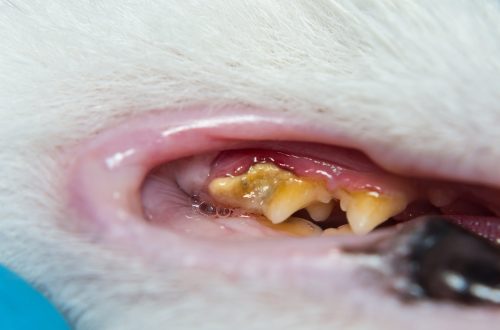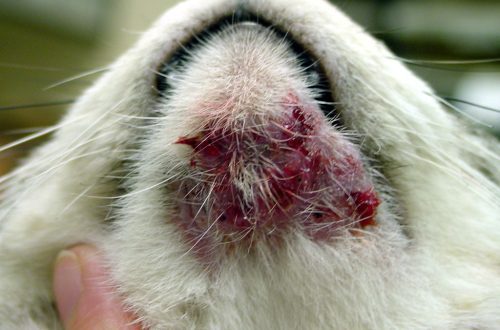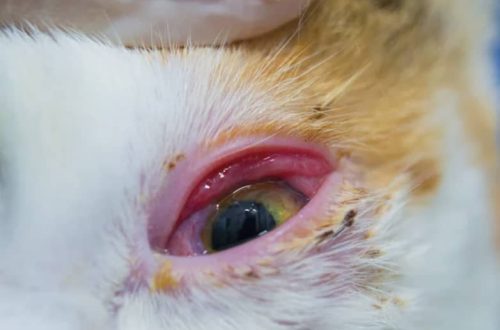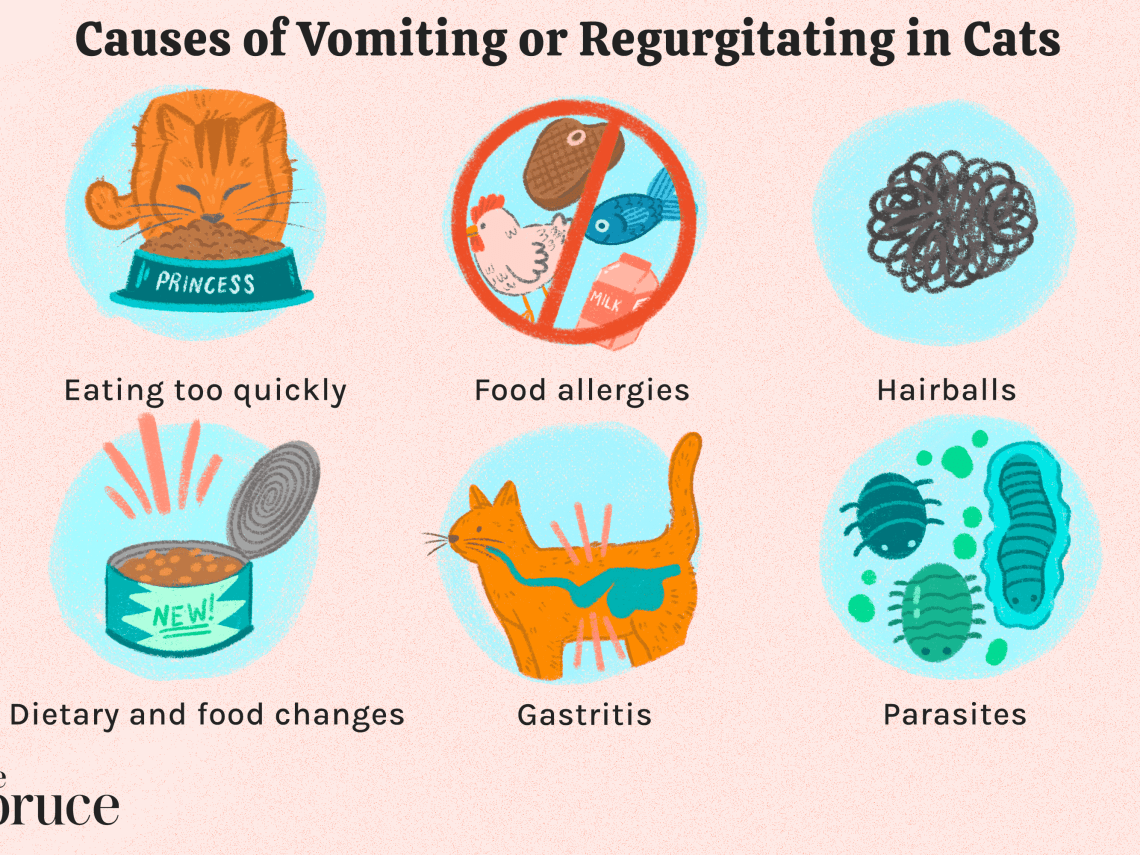
The cat vomits after eating – what to do?
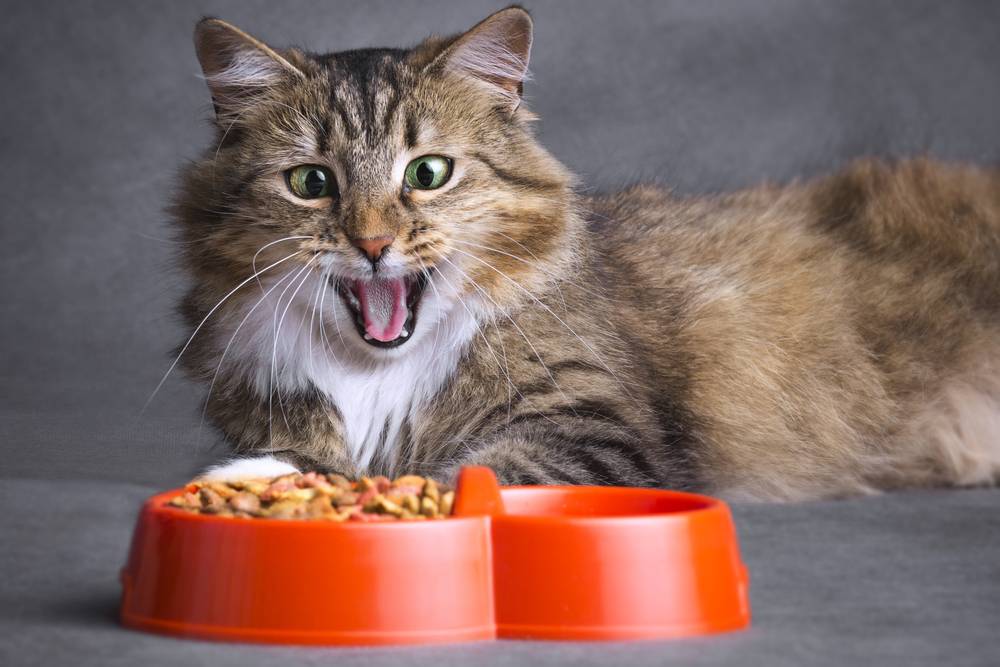
Contents
A cat or a cat vomits after eating: the main thing
vomiting in a cat after eating is a health-threatening condition, therefore, at the first attacks, the cat must be immediately shown to the veterinarian;
causes of vomiting after eating can be: gastritis, poisoning, foreign body entering the stomach or intestines, helminthic invasion and other reasons;
diagnostics must be comprehensive in order to exclude all possible concomitant diseases;
treatment depends on the cause: in the presence of a foreign body, surgery may be required, with gastritis and poisoning – conservative treatment, with helminthic invasion – giving anthelmintic drugs.

What can cause vomiting
From the point of view of physiology, vomiting causes irritation of receptors located in the esophagus and stomach. In cats, dangerous and non-dangerous causes of vomiting can be distinguished.
Dangerous reasons
Dangerous causes can conditionally include diseases that lead to the imminent death of the animal. These include:
poisoning with toxic substances (household chemicals, poisonous plants, some drugs);
blockage of the gastrointestinal tract by foreign substances;
exacerbation of such internal diseases as ulcerative gastritis, chronic renal failure, liver lipidosis, etc.
neoplasms in the stomach and intestines;
viral diseases such as panleukopenia, feline infectious peritonitis, leukemia.
Accompanying symptoms with dangerous causes of vomiting include a complete refusal to eat, loose stools or constipation. The pet can become lethargic, sad, the coat is dull.
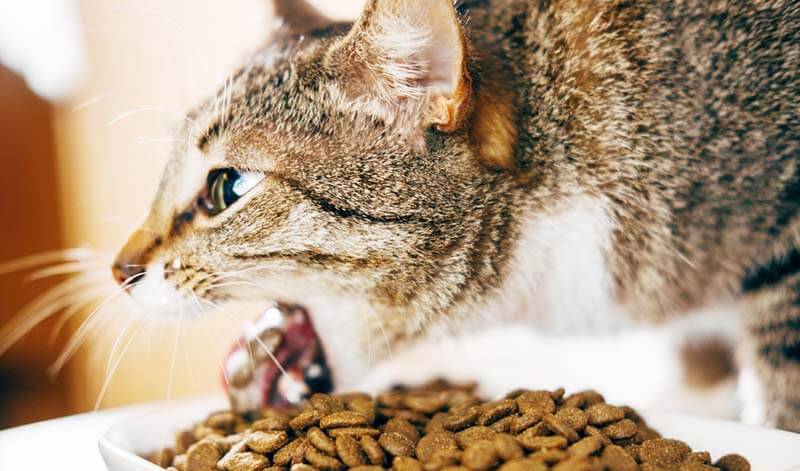
Non-dangerous causes of vomiting
The concept of “non-dangerous reasons”, of course, is arbitrary. Usually these include chronic diseases of the pet that do not need urgent treatment to the clinic.
Gastritis and sensitive digestion – most often these diseases develop as a result of improper feeding of the pet;
Vomiting caused by the ingestion of wool in the stomach; however, it must be taken into account that even a ball of hair can lead to complete obstruction of the gastrointestinal tract and the need for surgical intervention;
Vomiting due to stress or motion sickness, for example, when traveling in a car;
Vomiting as a result of the presence of helminthic invasion;
Vomiting during pet pregnancy, etc.
There are usually no associated symptoms in this case. But the cat may, for example, become more lethargic, eat less and refuse to play.
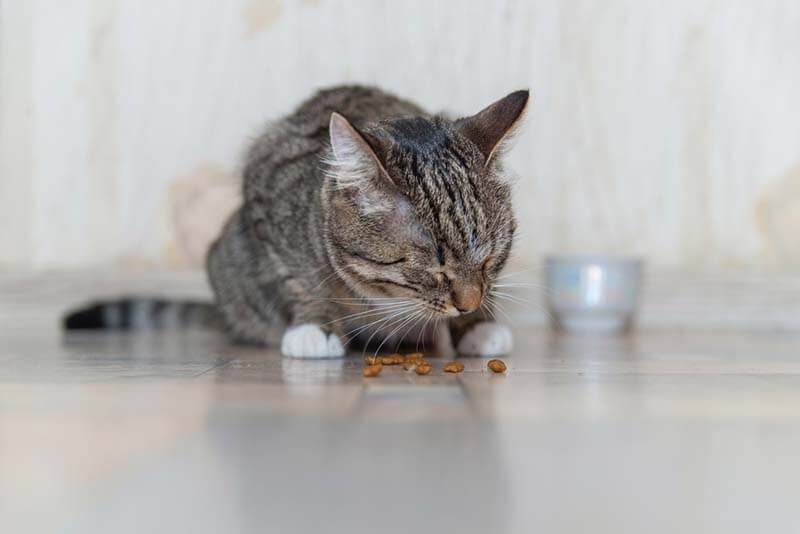
Types of vomiting
Vomiting undigested food
If a cat vomits after eating undigested food, it is most likely an acute inflammatory disease of the stomach or the presence of a foreign body in it. If the cat spits up after each meal, then an immediate visit to the veterinary clinic is necessary, since the pet’s food is not digested and dehydration, hypoglycemia and other pathologies can quickly set in.
Vomiting white foam
Vomiting white foam is often due to nutritional problems in the animal. If vomiting in the morning, before breakfast, this is the so-called hungry vomiting, which is associated with a large interval between dinner and breakfast. If vomiting is not related to the period of the day, then perhaps the pet should change its diet.
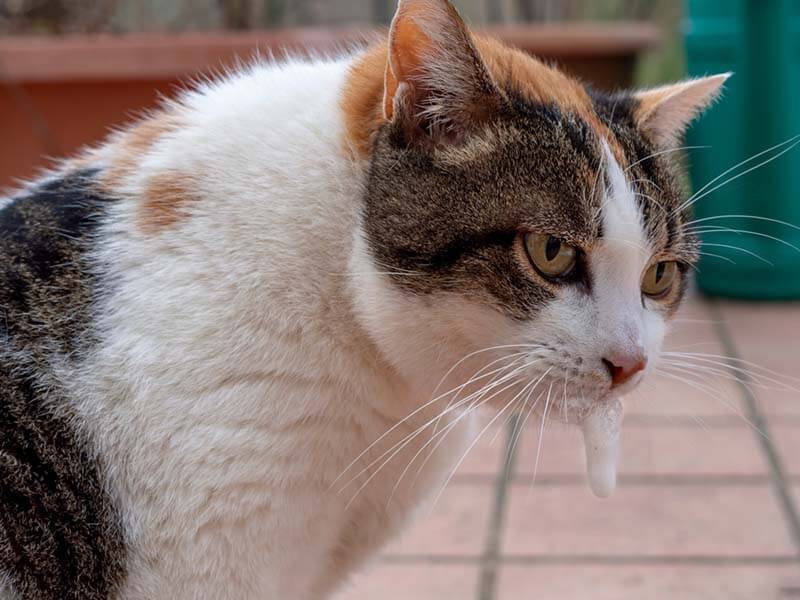
Vomiting yellow foam (bile)
Vomiting of bile is almost always associated with diseases of the liver and/or gallbladder and requires contacting a veterinary clinic for diagnosis and treatment.
Vomiting blood
Vomiting blood may indicate damage to the gastrointestinal tract as a result of gastritis, enteritis, etc., vomiting of whole blood is a life-threatening condition and may indicate gastric perforation, a large ulcer, or acute anticoagulant poisoning (rat poison).
Diagnostics
If a cat vomits after eating, a comprehensive diagnosis is required to identify the cause of this condition in order not to miss systemic diseases. First of all, the doctor conducts an examination, carefully examines the oral cavity for foreign objects, tries to look into the throat. Next, palpation is performed to identify painful foci. Further, blood tests and instrumental diagnostic methods (ultrasound and x-rays) are mandatory.
Blood tests – clinical and biochemical, are performed to detect systemic diseases of the pet. A general blood test reveals the presence of an inflammatory process that requires the appointment of antibiotics, and anemia, which may be the result of internal bleeding, blood parasitic disease, viral infection, chronic kidney disease, etc. Blood biochemistry determines diseases of the kidneys and liver.
Ultrasound of the abdominal cavity allows you to identify structural changes in the wall of the stomach, intestines, as well as the presence of a foreign object. Also, ultrasound can detect inflammatory diseases of the pancreas, liver, gallbladder, as well as the presence of neoplasms in the gastrointestinal tract. All of these changes can cause vomiting.

An x-ray is performed to rule out radiopaque foreign bodies in the stomach and intestines. In most cases, both ultrasound and abdominal x-rays are recommended: the fact is that only radiopaque objects are visible on x-rays, and ultrasound is not a reliable method to exclude the presence of foreign objects.
Vomiting in a cat with undigested food requires, first of all, an x-ray and ultrasound of the abdominal cavity to exclude the presence of a foreign object in the stomach or intestines.
Vomiting white foam while maintaining the appetite of the pet, as a rule, requires a trial treatment, which consists in changing the diet or food. If the condition is serious and the pet refuses to eat, a thorough and complete diagnosis is needed (ultrasound, X-ray, blood tests to exclude systemic pathologies).
Vomiting bile requires, first of all, blood tests and abdominal ultrasound to detect diseases of the liver and gallbladder.
Vomiting with blood requires an abdominal ultrasound to identify the causes of bleeding and the delivery of at least a general analysis to determine the degree of anemia and the need for a blood transfusion to the pet.
Treatment
What to do if a cat or cat spit up after eating depends on the type and cause of vomiting.
If a cat or a cat is sick and vomits after eating undigested food as a result of blockage of the gastrointestinal tract by a foreign object, treatment is carried out endoscopically or surgically.
White foam vomiting is most often treated by changing the diet (increasing the frequency of feeding, for cats it is recommended to feed ad libitum or portion feeding at least 6 times a day) or changing the line (for example, food for sensitive digestion, food with a different type of protein, if the pet is given economy class feed – transfer to premium feed).
In liver diseases, which are characterized by vomiting of bile, a special diet is required (hepatic food or strict homemade food compiled by a nutritionist), as well as symptomatic treatment, depending on the cause of the disease.
Vomiting with blood requires the appointment of a special diet for diseases of the gastrointestinal tract (line gastro intestinal or home meals compiled by a nutritionist), symptomatic treatment, and blood transfusion may also be required for severe anemia due to blood loss.
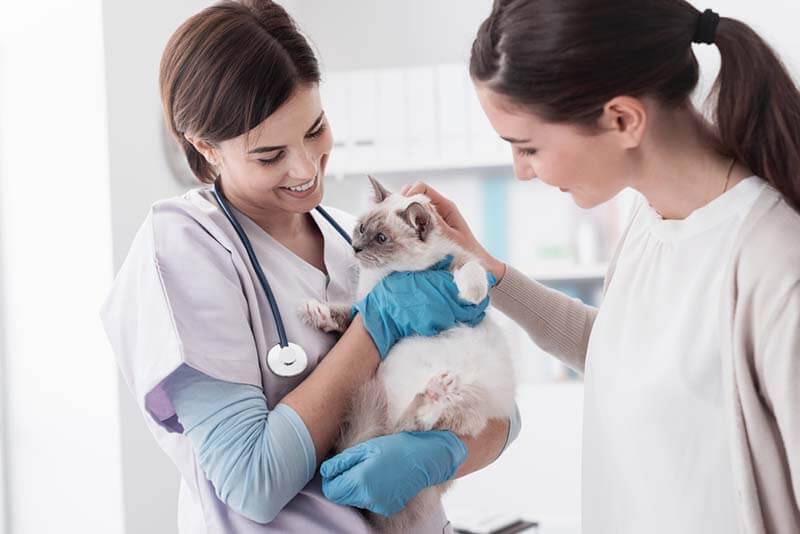
What can you do at home?
If your cat vomited up food, first of all, you need to determine whether he has retained his appetite. If, after vomiting, he refuses food and water, becomes sad and lethargic, self-medication cannot be done, because you can lose time, and the pet may die from peritonitis, liver lipidosis and sepsis. If the pet’s appetite and activity are preserved, you can try changing the diet to a therapeutic diet of the Gastro Intestinal line and give a paste for removing hair (“malt paste”) according to the instructions in a therapeutic dose. If the cat has not been treated for parasites for a long time, it is imperative to carry out a comprehensive treatment.
What is forbidden to do if the cat vomits after eating
If your cat is vomiting after eating undigested food, it is best not to self-medicate. Any drugs given by mouth, firstly, will come out with vomiting and will not help, and secondly, they can increase vomiting and aggravate the condition. Injection of antiemetics at home is also undesirable: some of them can have a detrimental effect, as they increase the peristaltic movements of the intestine and can lead to its rupture in the presence of a foreign body. Other antiemetics that only act on the vomiting center can blur the picture of the disease, and thus, you may miss the time to start diagnosis and treatment.
What to do if the kitten vomited food?
If the kitten vomited food, first of all, it is necessary to exclude helminthic invasion. If the kitten has never been treated for parasites or has been treated for a long time, it is necessary to carry out the treatment! From worms for kittens, tablet preparations based on milbemycin oxime or drops on the withers with emodepsid and praziquantel help well. If the kitten vomited several times, he became sad, lethargic, refuses to eat, you must urgently contact a veterinary clinic, otherwise the kitten may die!
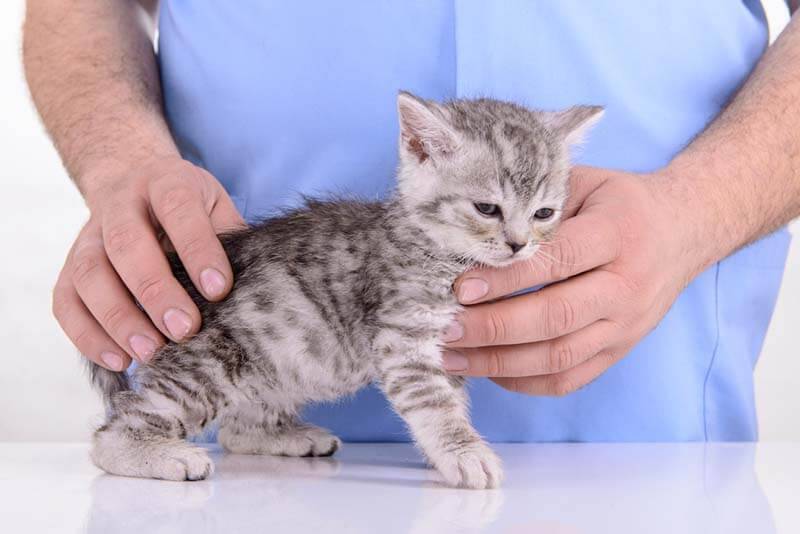
Prevention
So, we figured out why a cat or a cat can feel sick with food after eating, now let’s look at how to prevent it.
The most important thing is to follow the basic rules for keeping animals:
Cats need regular deworming, whether they’re indoors or have access to the outdoors – parasite eggs can be brought in from the outdoors!
It is very important to feed cats properly, the so-called food from the table will sooner or later lead to a pet’s illness! If you do not want to feed your cat with industrial feeds, we recommend that you contact a nutritionist for a balanced menu.
To prevent vomiting hair, as well as the formation of tangles, do not forget to brush your cats regularly, especially during the molting period.
Preventive vaccination will protect your pets from many viral diseases that a cat can pick up even while sitting at home.
It is also important to exclude the possibility of poisoning with household chemicals and poisonous plants!
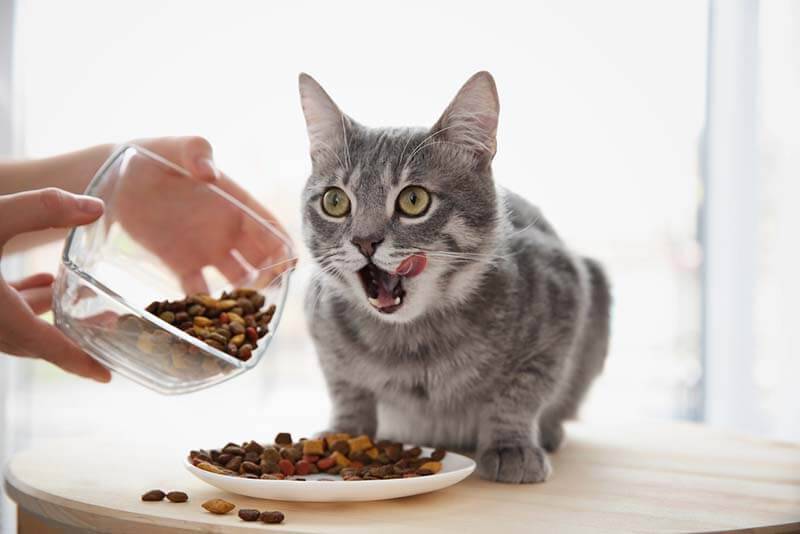
summary table
Type of vomiting | Cause | Diagnostics | Treatment |
undigested feed | Acute inflammatory disease of the stomach or the presence of a foreign body in the stomach | X-ray and ultrasound of the abdomen | In the presence of a foreign body – treatment by endoscopic or surgical means, with gastritis – drug therapy |
white foam | Problem with diet or selected food | Trial treatment, which consists in changing the diet or feed. In the absence of improvements, complex diagnostics (ultrasound, X-ray, blood tests) are necessary | Changing the diet (increasing the frequency of feeding) or changing the feed |
Bile | Diseases of the liver and/or gallbladder | Blood tests and abdominal ultrasound | Special diet (hepatic food or strict homemade food prepared by a nutritionist), as well as symptomatic drug treatment |
Blood | Damage to the gastrointestinal tract as a result of gastritis, enteritis, foreign body (usually bone) | Abdominal ultrasound and complete blood count | A special diet for diseases of the gastrointestinal tract (lines of gastro intestinal or home meals compiled by a nutritionist), symptomatic treatment, and blood transfusion is also possible in case of severe anemia due to pet blood loss. |



